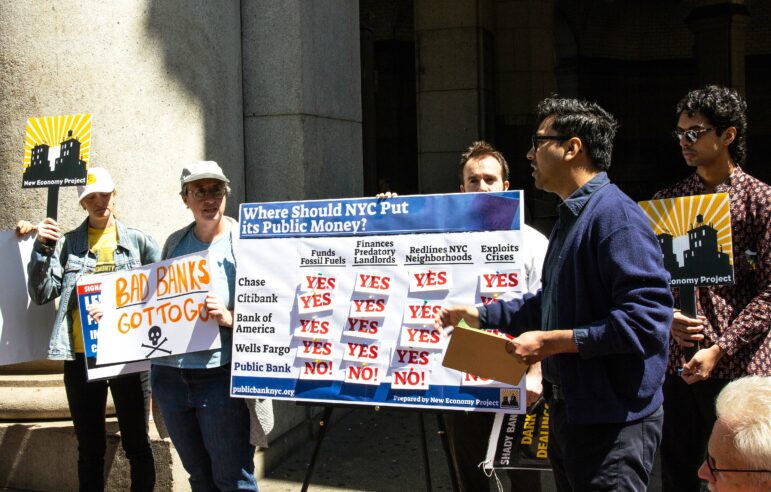When two leaders in state welfare policy urged city social services providers earlier this month to get their top policy recommendations ready to deliver to New York’s new governor the day after election day, the providers were already well on their way to doing just that.
State Senator Liz Krueger, a founder of the Welfare Reform Network (WRN), and state Assemblywoman Deborah Glick, chairperson of the Assembly’s Committee on Social Services, urged WRN members to develop proposals by the time a new governor is elected about how to secure housing for lower-income people and get them into college or other skills-building education, as well as make sure children have quality preschool.
“What I’ve said to many organizations is that November 8 is the beginning of a very short campaign…[You need] to lobby the incoming administration before inauguration in January,” Glick said. Advocates should articulate five main items they’d like to see included in the executive budget, she said.
But “I don’t think welfare has particularly gotten attention from the Spitzer campaign,” Krueger said.
Advocates recently formed an ad hoc committee in support of social services goals, unofficially titled the TANF Implementation Strategy Group (ISG), according to Hunger Action Network Executive Director Bich Ha Pham. The group aims “to persuade the state to make positive, humane, non-punitive and -restrictive changes” in response to new federal regulations about Temporary Assistance to Needy Families (TANF), said Community Service Society Senior Policy Analyst Don Friedman, an ISG member.
If Democratic Attorney General Eliot Spitzer is elected governor, social services advocates hope the administrators he appoints will take their advice, including following successful models other states have implemented.
“We’d love it if the new governor put in a strong anti-poverty advocate who has a real record of working on this issue for many years and who has shown real knowledge and real insights as to policies that can actually alleviate poverty,” Pham said. Several in attendance at the WRN meeting said they’re not hearing any buzz, however, about who might head the state Office of Temporary and Disability Assistance or hold other key positions.
While the strategy group’s proposals are yet to be finalized, a draft legislative agenda created by the Federation of Protestant Welfare Agencies outlines specific objectives in the areas of child care and early education, child welfare, elderly welfare, HIV and AIDS, income security and youth services. Preliminary recommendations in these areas include expanding universal pre-kindergarten, providing funds needed to lower social workers’ foster care caseloads, supporting annual cost-of-living adjustments to those receiving Supplemental Security Income, and helping to meet the new, higher TANF work participation rate – the number of recipients counted as involved in work activities – by getting recipients enrolled in education and training.
“Trial and error…[has shown] higher education moves families out of poverty for good,” said Krueger.
According to Pham, states like Kentucky and Maine have been successful in executing programs that foster higher learning for the underprivileged. “We’d like to see a new commissioner implement some of those models in the state … to focus on not just pushing people off welfare, but making sure that people in New York are economically secure,” Pham said.
Fiscal Policy Institute Senior Economist Trudi Renwick, another ISG member, called the new TANF requirements “an opportunity.” Rather than rushing to close welfare cases, “a better way to go about it is to offer something that would count as assistance to those who are working,” Renwick said. “I would hope the Spitzer administration would take this opportunity to lean towards this approach.”
In a questionnaire from the Human Services Council of New York City that gubernatorial candidates answered this summer, Spitzer said, “We need to … [leverage] federal funds for key social services and programs … reform the grant-making process so that social services rely less on discretionary spending … strengthen accountability to ensure services and programs aren’t duplicated and the needs of New Yorkers are met.”
Advocates are hoping a new governor will bring a new philosophy about welfare with him. “The Pataki administration was concerned with a work-first philosophy, which was getting people off the welfare roll and into any job, whether that was a minimum wage job or very low-wage job, and that was all they were really concerned with,” Pham said. As a result, many of these families had to reapply for welfare because they could not support themselves, she said.
Spitzer campaign spokesperson Christine Anderson last week gave some hint of the candidate’s approach. “Eliot’s thinking is, we need to turn welfare reform into economic growth. We reduce the welfare caseload while ensuring those who need welfare still have the support they need to live in economic security,” Anderson said.
Renwick, however, said she does not expect the prospective governor to focus on such issues while campaigning.
“It is hard to imagine this is going to be a high priority for the Spitzer campaign. Of course, they can’t ignore it because there are some fiscal penalties if we don’t meet the fiscal requirements,” Renwick said.
Spitzer’s workers “are in campaign mode. Unless [a candidate] is going to bash welfare it isn’t a campaign issue. So, are we upset that they don’t talk about welfare in their campaign? No,” Renwick said.








